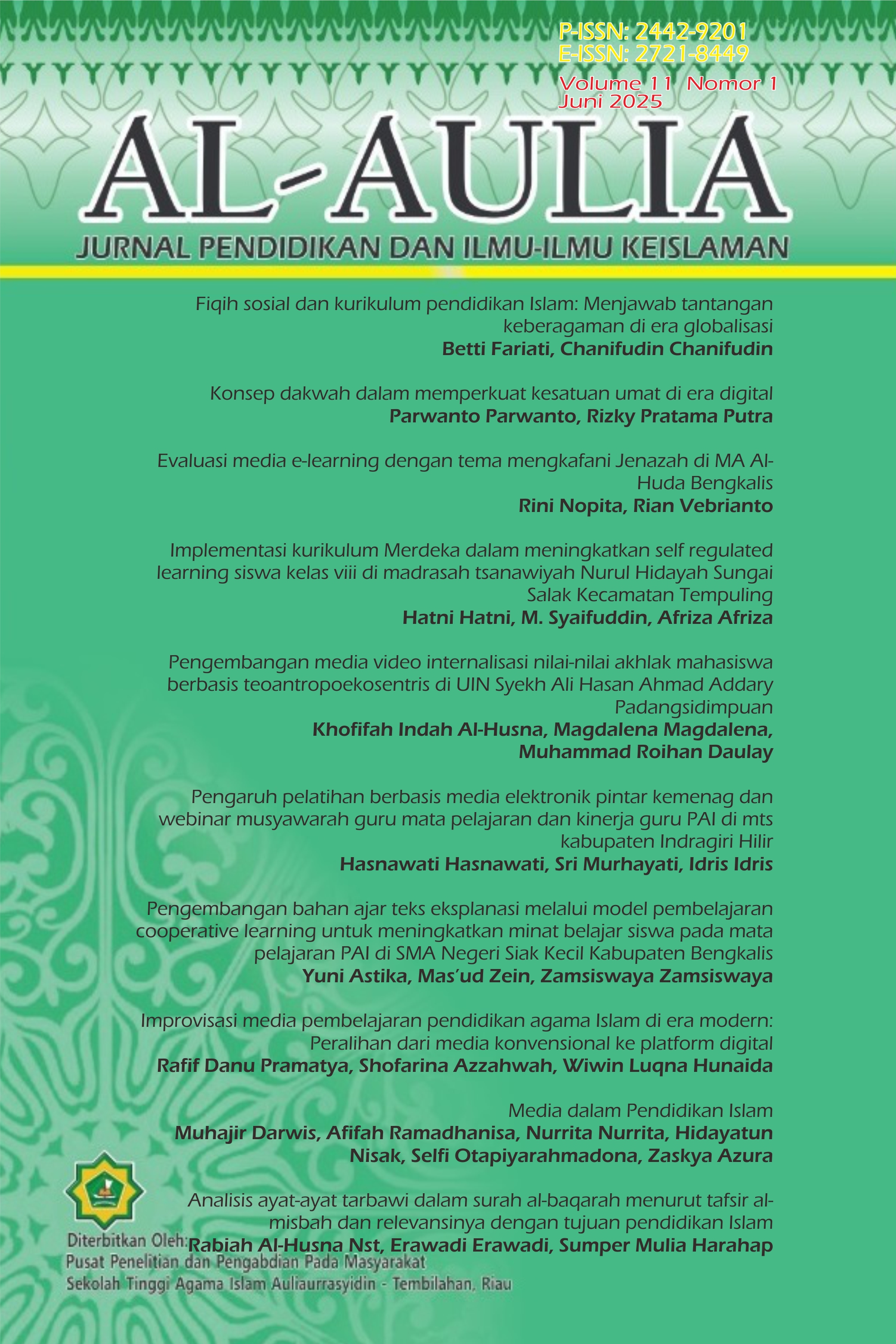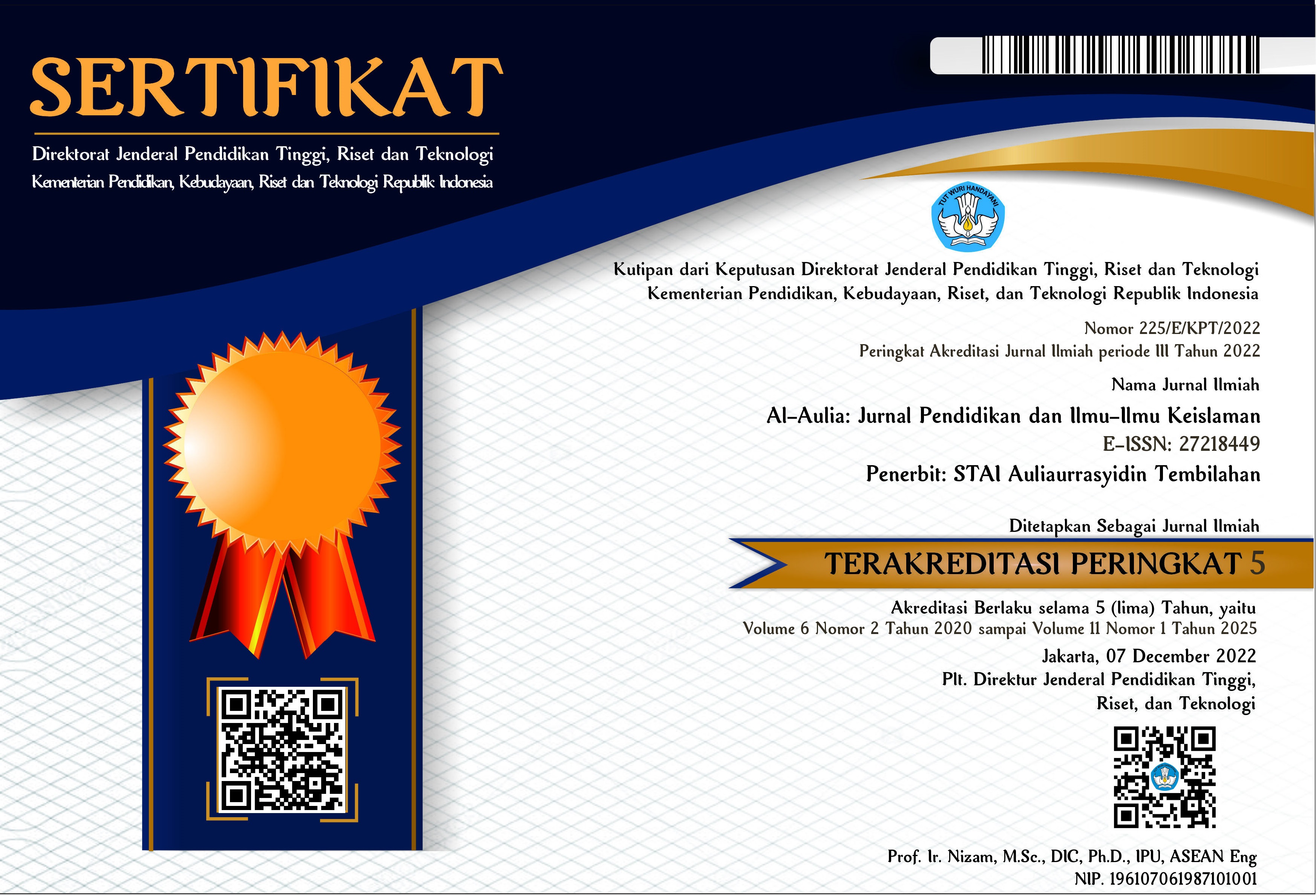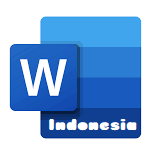Konsep dakwah dalam memperkuat kesatuan umat di era digital
DOI:
https://doi.org/10.46963/aulia.v11i1.2596Keywords:
Concepts, Da'wah, The Digital AgeAbstract
In the context of Muslim life today, da'wah has a very important role in strengthening the unity of the ummah, especially in this digital era. But many of the preachers are wrong in determining the right concept for preaching in this digital era. So this research seeks to present the right concept for preaching that can unite people, especially in this digital era. This research uses a qualitative approach by presenting data sources that are relevant to the discussion by documenting the data obtained, so that it becomes data that is ready to be processed . The results of the analysis of several sources that have been presented, found that the concept of da'wah that is appropriate to unite people in this digital era is divided into three concepts. The first is the concept of da'wah with wisdom or wisdom, then the second is the concept of da'wah with good advice and the third concept is arguing with good arguments.
References
Agusman, M. H. (2021). Konsep dan Pengembangan Metode Dakwah Di Era Globalisasi. Da'wah : Risalah Merintis, Dakwah Melanjutkan, 52.
Alimuddin, N. (2007). Konsep Dakwah Dalam Islam . Hunafa, 76.
Andini, I. P. (April 2023 ). Perubahan Dakwah Di Era Digital . ALADALAH: Jurnal Politik, Sosial, Hukum dan Humaniora Vol. 1, No. 2.
Awaludin Pimay, Fania Mutiara Savitri. (2021 ). Dinamika dakwah Islam di era modern . Jurnal Ilmu Dakwah, Volume 41 No 1 (2021).
Basoeky, R. A. (2023). Manajemen Dakwah Dalam Era Digital: Strategi dan. Triwikrama: Jurnal Multidisiplin Ilmu Sosial, Volume 01, Number 01.
Fiantika, F. R. (2022). Metodologi Penelitian Kualitatif . Sumatera Barat: PT Global Eksekutif Teknologi.
Gabriella Marysca Enjel Nikijuluw, A. R. (2021). perilaku masyarakat di era digital (studi di desa watutumou iii kecamata kalawat kabupaten minahasa utara). JAP : Jurnal Administrasi Publik, 6.
Ghofari Sulton, A. S. (2024). Karakteristik Orang-orang Munafik dalam Surat Al-Munafiqun (Studi Tafsir Ibnu Katsir). Hamalatul Qur’an: Jurnal Ilmu-Ilmu, 172.
Hamka, B. (1998). Tafsir Al Azhar. Singapura: Pustaka Nasional PTE LTD.
Hamka. (1974). Kenang2-an Hidup. Jakarta: Bulan Bintang.
Harry Saptarianto, d. (2024). Menghadapi Tantangan Era Digital, Strategi Integrasi Media Sosial, Literasi Digital dan Inovasi Bisnis. Jurnal Manuhara: Pusat Penelitian Ilmu Manajemen dan Bisnis, 128.
Ibnu Kasir, S. A. (2024). Peran Dakwah Digital dalam Menyebarkan Pesan Islam di Era Modern. Jurnal An-Nasyr: Jurnal Dakwah Dalam Mata Tinta, 60.
Irfan, R. (2022). Penafsiran Da'i dalam Tafsir Al-Azhar. Al-Kauniyah: Jurnal Ilmu Alquran dan Tafsir .
Latifah, N. (2023). Strategi Dakwah Islam di Era Digital. Al-Insan: Jurnal Bimbingan Konseling dan Dakwah Islam, 108.
Mokodompit, N. F. (2022). Konsep Dakwah Islamiyah . Ahsan: Jurnal Dakwah dan KomunikasiVol. 1, No. 2.
Muhamat Khoirul Amirudin, M. F. (2023). Persatuan Umat Antara Keniscayaan Dan Kemustahilan (Kajian Tafsir Maudhu’i Ayat-Ayat Al-Qur’an Tentang Persatuan). Spiritualis: Jurnal Pemikiran Islam dan Tasawuf, 43-44.
Nur, D. M. (2011). Dakwah Teori, Definisi Dan Macamnya. Wardah, 139.
Rahayu, P. (2019). Pengaruh Era Digital Terhadap Perkembangan Bahasa Anak. Al-Fathin: Jurnal Bahasa dan Sastra Arab, 48.
Ritonga, A. H. (2020). Konsep Umat dalam Al-qur’an (Perspektif Pengembangan Masyarakat). Jurnal At-Taghyir : Jurnal Dakwah dan Pemberdayaan Masyarakat Desa, 105.
Rizky Pratama Putra, Muhmmad Ainul Yaqin, Akhmadiyah Saputra. (2024). Objek Evaluasi Hasil Belajar Pendidikan Agama Islam: Analisis Taksonomi Bloom (Kognitif, Afektif, Psikomotorik). AL-KARIM: Journal of Islamic and Educational Research, Volume 2, Nomor 1.
Sarwan. (n.d.). Sejarah dan Perjuangan Buya Hamka : di atas api di bawah api. Padang: The Minangkabau Foundation.
Siti Nazlatul Ukhra, Z. (2021). Tafse: Journal of Qur'anic Studies. Konsep Persatuan dalam Al-Qur'an dan Relevansinya dengan Pancasila Sila Ketiga, 117.
Downloads
Published
Issue
Section
License
Copyright (c) 2025 Parwanto Parwanto, Rizky Pratama Putra

This work is licensed under a Creative Commons Attribution-ShareAlike 4.0 International License.
Authors who publish with this journal agree to the following terms:
1. Copyright on any article is retained by the author(s).
2. The author grants the journal, right of first publication with the work simultaneously licensed under a Creative Commons Attribution License that allows others to share the work with an acknowledgment of the work’s authorship and initial publication in this journal.
3. Authors are able to enter into separate, additional contractual arrangements for the non-exclusive distribution of the journal’s published version of the work (e.g., post it to an institutional repository or publish it in a book), with an acknowledgment of its initial publication in this journal.
4. Authors are permitted and encouraged to post their work online (e.g., in institutional repositories or on their website) prior to and during the submission process, as it can lead to productive exchanges, as well as earlier and greater citation of published work.
5. The article and any associated published material is distributed under the Creative Commons Attribution-ShareAlike 4.0 International License







